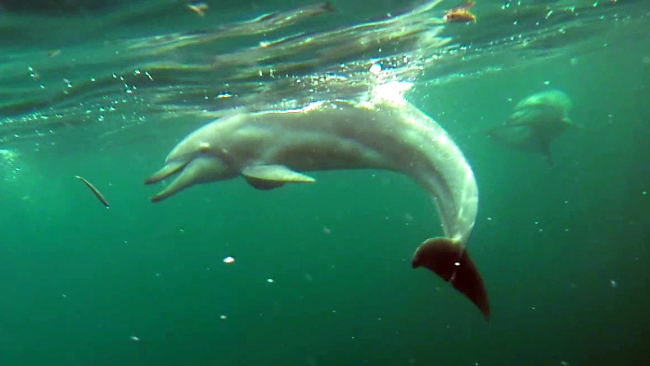Two Indo-Pacific bottlenose dolphins, dubbed “Jedori” and “Chunsami,” returned to the sea near Kimnyoung on Jeju Island, Thursday, from an offshore pen where they had been training to adapt to the wild.
Jedori and Chunsami were illegally captured near the coasts of Seogwipo and Jeju City in May and June 2009, respectively.
It took Jedori 1,540 days and Chunsami 1,487 days to return to the wild.
The ceremony to set them free was attended by officials from Seoul City, Jeju Province, Jeju Special Self-Governing Provincial Police Agency, the Ministry of Oceans and Fisheries, Jeju National University, animal rights groups, an environmental group and citizens.
 |
Two Indo-Pacific bottlenose dolphins, named Jedori and Chunsami, swim in an offshore pen on the coast of Kimnyoung, Jeju City. (Yonhap News) |
The event began with the unveiling of a stone monument on the shore of Kimnyoung.
The monument made from a basalt stone found on the island carries the inscription, “Jedori’s dream was the sea,” in large, Korean letters. It is 215 centimeters tall, 105 centimeters across and 80 centimeters thick.
On the stone platform below the monument is written, “Jedori, an Indo-Pacific bottlenose dolphin that did dolphin shows in Seoul Zoo, has been released to the sea at the people’s will.”
Following the unveiling of the monument, an underwater net in the pen was opened, and Jedori and Chunsami swam into the sea.
Jedori was seized near Sungsan and then sold to aquariums for dolphin shows, first on Jeju island and then at Seoul Zoo in Gyeonggi Province.
Animal rights groups raised suspicions of dolphin abuse and Seoul Mayor Park Won-soon decided on March 12 last year to release Jedori into the sea.
Indo-Pacific bottlenose dolphins live in the waters around India, northern Australia, South China, the Red Sea and the eastern coast of Africa. They are endangered species.
By Chun Sung-woo (
swchun@heraldcorp.com)




![[Herald Interview] 'Trump will use tariffs as first line of defense for American manufacturing'](http://res.heraldm.com/phpwas/restmb_idxmake.php?idx=644&simg=/content/image/2024/11/26/20241126050017_0.jpg)

![[Health and care] Getting cancer young: Why cancer isn’t just an older person’s battle](http://res.heraldm.com/phpwas/restmb_idxmake.php?idx=644&simg=/content/image/2024/11/26/20241126050043_0.jpg)

